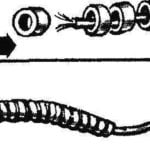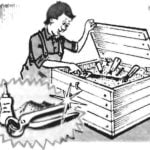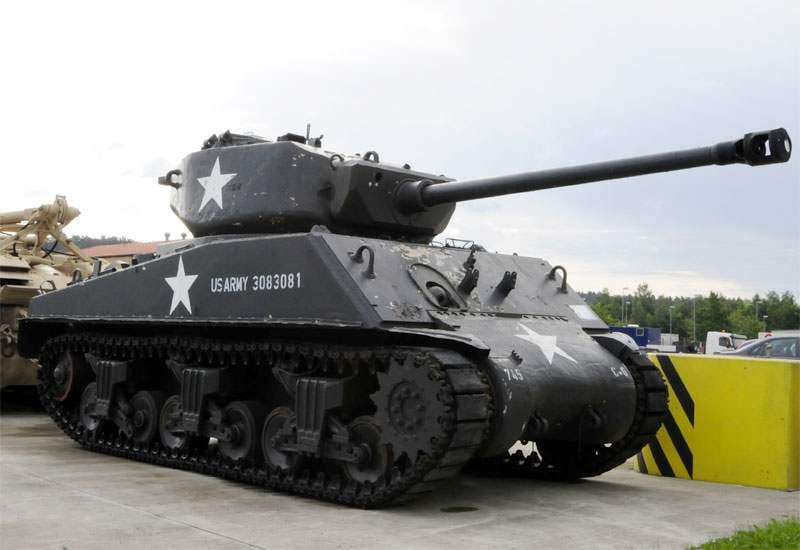 In January 1944, the headquarters of the U.S. army in Europe, stationed at the moment in the UK, was sent for consideration to Washington’s urgent request to manufacture 250 heavy tanks for the upcoming campaign in France. The staff officers believed that the need for tanks with a high level of security will be to overcome the fortifications of the “Siegfried Line”. In Washington, agreed that the heavy assault tank will be needed during the impending hostilities in Europe. Because it was quite obvious that the new heavy tank Т26Е2 (future “Pershing”) will not be ready for many months, the command of armored forces was the recommended project, which was based on the medium tank М4АЗ. Alternatively, however, the gunners have offered to accommodate for this role, heavy tank M6, but tankers are opposed because of the numerous shortcomings of the latter identified during testing. These disputes were resolved in early March 1944 in favor of the assault tank (Assault Tank), the designation М4АЗЕ2.
In January 1944, the headquarters of the U.S. army in Europe, stationed at the moment in the UK, was sent for consideration to Washington’s urgent request to manufacture 250 heavy tanks for the upcoming campaign in France. The staff officers believed that the need for tanks with a high level of security will be to overcome the fortifications of the “Siegfried Line”. In Washington, agreed that the heavy assault tank will be needed during the impending hostilities in Europe. Because it was quite obvious that the new heavy tank Т26Е2 (future “Pershing”) will not be ready for many months, the command of armored forces was the recommended project, which was based on the medium tank М4АЗ. Alternatively, however, the gunners have offered to accommodate for this role, heavy tank M6, but tankers are opposed because of the numerous shortcomings of the latter identified during testing. These disputes were resolved in early March 1944 in favor of the assault tank (Assault Tank), the designation М4АЗЕ2.
In contrast to the linear М4АЗ on М4АЗЕ2 used a new turret with 152-mm armor. Front part of the housing, a combined cover compartment, had a thickness of 135 mm. Additional 37-mm armor plates welded to the sides and to the upper frontal hull. Since all of this increased the weight of the tank up to 42 t, the tracks were installed extenders. The tank’s armament consisted of a staff of 75 mm gun M3, which was placed in musk-T110 install 7.62-mm machine gun Browning М1919А4 (according to some, the assault tanks were initially installed coaxial 12.7 mm machine gun М2НВ) and the same exchange machine gun On the roof of the tower housed heavy anti-aircraft gun. The layout of the car, most body parts, interior equipment, ammunition and location, engine, transmission and chassis remained unchanged.
The army approved the release of a series of 250 assault tanks to receive delivery by August 1944. The design was carried out very quickly, the first forty cars was assembled at the tank Arsenal in Grand Blanc in may, and the production of whole series ended on 29 August 1944 there were produced 254 tank.
The first of М4АЗЕ2 began to arrive in France in September, and in mid-October, 54 units were sent to the 1st American army, at the end of October they were joined by 105 tanks. 90 М4АЗЕ2 sent to the 3rd army and 9th — 60 combat vehicles of this type. By the end of November a small number of tanks were sent to the 7th us army in Alsace.
М4АЗЕ2 tank Cobra King. Company “C” of the 37th tank battalion, 4th armored division. Bastogne, December 1944
The US army had no tactical doctrine for the use of assault tanks, and officers in army headquarters in Europe, came to the conclusion that such machines will be more useful in separate tank battalions assigned to infantry divisions. For example, in the 10th armored division of the 3rd army of General George. Patton at the end of November 1944 they were only five. At the same time in the 737th tank battalion were 15, and five in 702,712,735-m 761-m tank battalions. Initially, some commanders of the Panzer divisions in the army, Patton saw no need to assault the tank. But as soon as the field was soaked from the autumn rain, the movement was only possible on paved roads. In other words, the raw terrain narrowed the front of the grinder literally to the width of only one tank. In such circumstances, tolstobrova М4АЗЕ2 come at an opportune moment. In the assault of fortifications “Siegfried Line” they were not involved because of the assault as such was not, but then they began to put the head tank columns and forward detachments. So the machines began to enjoy great respect from the soldiers. Tank crews found that, despite the increased mass, М4АЗЕ2 as maneuverable as regular medium tanks M4. But the main advantage was, of course, thick armor, able to withstand direct hits from 88 mm guns when shooting from a normal distance — most of the tanks were hit when hit in the side. There is only one case of penetration of the frontal armor of the tower М4АЗЕ2 88-mm shell from a distance of about 700 m. as a result, the commanders of the Panzer divisions changed their opinion and started asking assault tanks So that the last arrived at the front in December were in the armored divisions. Assault “Sherman” proved so popular that the commander of the 6th Panzer division recommended to re-equip the tank corps on М4АЗЕ2 and M4 with 105 mm howitzers in the ratio 2:1 4 Panzer division, for example, received several of these machines at the end of December prior to the operation of unblocking the American 101st airborne division surrounded in Bastogne during the German offensive in the Ardennes. The head tank during the offensive of Patton at Bastogne was М4АЗЕ2 company “C” of the 37th tank battalion under the command of Lieutenant Charles Bogese, nicknamed King Cobra. Bodies was awarded the Silver star for bravery during the battle for the town of Copeville, well, a King Cobra was the first American tank that entered into Bastogne on 26 Dec 1944. Incidentally, this tank was not destroyed during the war and is now in Wilsele, in Germany, on the basis of the current 37th armored regiment of the U.S. army.

Assault tank M4A3E2:
1 — 75-mm gun; 2 — mask-set T110, 3 — bracket mounting anti-aircraft machine gun; 4 — removable compartment cover; 5 — the commander’s cupola; 6 — Luke loader; 7 — filler cap of fuel tanks; 8 — hatch for access to engine, 9 — loophole sight, 10 — recess coaxial machine gun; 11 — bracket barrel of the gun in its stowed position; 12 — casing of the exhaust fan
In early January 1945 the headquarters of Eisenhower reported to Washington that “assault tank М4АЗЕ2 well proved in battle, and was warmly received. Front imperative the maximum number of such tanks, which may be accomplished without significantly reducing the total flow of tanks to the continent. These tanks should be equipped with the 76 mm cannon”. However, the command of armored forces came to the conclusion that by the time when will be ready a new series М4АЗЕ2 new heavy tank M26.
As for the 76-mm cannon, in February 1945 by the army repair shops it rearmed all the remaining in the ranks of the assault tanks, since the size of the tower was allowed to do it. In this form М4АЗЕ2 he served until the end of the war. Assault tanks were planned to be used for the invasion of Japan, but none of them participated in military operations in the Pacific.
Tank М4АЗЕ2. The 69th tank battalion 6th armored division. Germany, March 1945
Tank М4АЗЕ2. 15th tank battalion 6th armored division. Germany, March 1945
It is interesting to note that in modern literature is often found nickname this tank “Jumbo” “Jumbo” (named after a flying elephant from the disney cartoon), allegedly given to him by the soldiers. However, according to the authoritative American researcher Steven Liens, is a postwar invention. In any document of wartime, which he was able to find this tank not indicated otherwise М4АЗЕ2
Despite the very small number of cars produced of this type, surprisingly, they survived quite a lot
In addition to the Cobra King Willeke, there are instances in the Patton Museum in Fort Knox, the Museum of the Belgian army in Brussels, in the collection of Jack Littlefield in California and in the military Museum of Minnesota.
M. BARYATINSKY
Recommend to read
 CORD PROTECTION
CORD PROTECTION
Cord electric soldering iron is typically not heat-resistant insulation. Therefore at its hit on a hot tip, perhaps a quick melt insulation and short circuit of wires. To avoid this, it... IN THE SAND WITH OIL
IN THE SAND WITH OIL
Usually in rural houses and garden plots economic tool stored in sheds or workshops outside of the house. Such areas are characterized by high humidity, corrosion of metal parts. To...
 In January 1944, the headquarters of the U.S. army in Europe, stationed at the moment in the UK, was sent for consideration to Washington’s urgent request to manufacture 250 heavy tanks for the upcoming campaign in France. The staff officers believed that the need for tanks with a high level of security will be to overcome the fortifications of the “Siegfried Line”. In Washington, agreed that the heavy assault tank will be needed during the impending hostilities in Europe. Because it was quite obvious that the new heavy tank Т26Е2 (future “Pershing”) will not be ready for many months, the command of armored forces was the recommended project, which was based on the medium tank М4АЗ. Alternatively, however, the gunners have offered to accommodate for this role, heavy tank M6, but tankers are opposed because of the numerous shortcomings of the latter identified during testing. These disputes were resolved in early March 1944 in favor of the assault tank (Assault Tank), the designation М4АЗЕ2.
In January 1944, the headquarters of the U.S. army in Europe, stationed at the moment in the UK, was sent for consideration to Washington’s urgent request to manufacture 250 heavy tanks for the upcoming campaign in France. The staff officers believed that the need for tanks with a high level of security will be to overcome the fortifications of the “Siegfried Line”. In Washington, agreed that the heavy assault tank will be needed during the impending hostilities in Europe. Because it was quite obvious that the new heavy tank Т26Е2 (future “Pershing”) will not be ready for many months, the command of armored forces was the recommended project, which was based on the medium tank М4АЗ. Alternatively, however, the gunners have offered to accommodate for this role, heavy tank M6, but tankers are opposed because of the numerous shortcomings of the latter identified during testing. These disputes were resolved in early March 1944 in favor of the assault tank (Assault Tank), the designation М4АЗЕ2.






